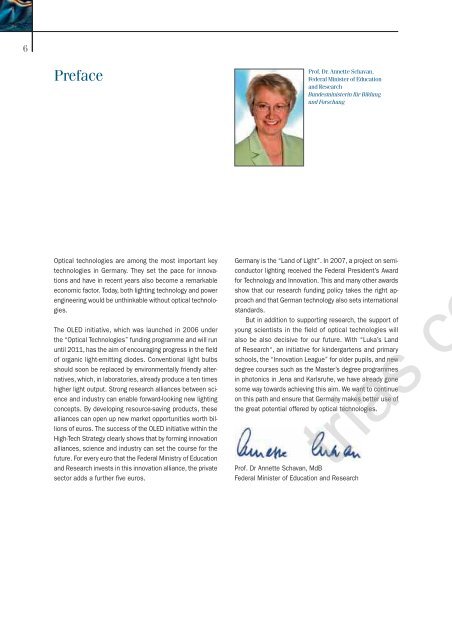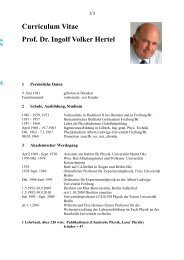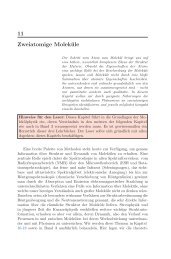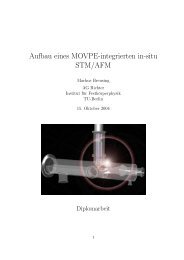trias consult - Mitarbeiter-Homepages des MBI: Max-Born-Institut für ...
trias consult - Mitarbeiter-Homepages des MBI: Max-Born-Institut für ...
trias consult - Mitarbeiter-Homepages des MBI: Max-Born-Institut für ...
Create successful ePaper yourself
Turn your PDF publications into a flip-book with our unique Google optimized e-Paper software.
6 7<br />
Preface<br />
Optical technologies are among the most important key<br />
technologies in Germany. They set the pace for innovations<br />
and have in recent years also become a remarkable<br />
economic factor. Today, both lighting technology and power<br />
engineering would be unthinkable without optical technologies.<br />
The OLED initiative, which was launched in 2006 under<br />
the “Optical Technologies” funding programme and will run<br />
until 2011, has the aim of encouraging progress in the field<br />
of organic light-emitting dio<strong>des</strong>. Conventional light bulbs<br />
should soon be replaced by environmentally friendly alternatives,<br />
which, in laboratories, already produce a ten times<br />
higher light output. Strong research alliances between science<br />
and industry can enable forward-looking new lighting<br />
concepts. By developing resource-saving products, these<br />
alliances can open up new market opportunities worth billions<br />
of euros. The success of the OLED initiative within the<br />
High-Tech Strategy clearly shows that by forming innovation<br />
alliances, science and industry can set the course for the<br />
future. For every euro that the Federal Ministry of Education<br />
and Research invests in this innovation alliance, the private<br />
sector adds a further five euros.<br />
Prof. Dr. Annette Schavan,<br />
Federal Minister of Education<br />
and Research<br />
Bun<strong>des</strong>ministerin <strong>für</strong> Bildung<br />
und Forschung<br />
Germany is the “Land of Light”. In 2007, a project on semiconductor<br />
lighting received the Federal President’s Award<br />
for Technology and Innovation. This and many other awards<br />
show that our research funding policy takes the right approach<br />
and that German technology also sets international<br />
standards.<br />
But in addition to supporting research, the support of<br />
young scientists in the field of optical technologies will<br />
also be also decisive for our future. With “Luka’s Land<br />
of Research“, an initiative for kindergartens and primary<br />
schools, the “Innovation League” for older pupils, and new<br />
degree courses such as the Master’s degree programmes<br />
in photonics in Jena and Karlsruhe, we have already gone<br />
some way towards achieving this aim. We want to continue<br />
on this path and ensure that Germany makes better use of<br />
the great potential offered by optical technologies.<br />
Prof. Dr Annette Schavan, MdB<br />
Federal Minister of Education and Research<br />
Die optischen Technologien gehören in Deutschland zu den<br />
zentralen Schlüsseltechnologien. Sie sind Schrittmacher <strong>für</strong><br />
Innovationen und wurden in den vergangenen Jahren zu<br />
einem beeindruckenden Wirtschaftsfaktor. Weder aus der<br />
Beleuchtungs- noch aus der Energietechnik sind optische<br />
Technologien heute wegzudenken.<br />
Mit der OLED-Initiative, die 2006 im Rahmen <strong>des</strong> Förderprogramms<br />
„Optische Technologien“ gestartet ist, wollen<br />
wir bis 2011 die Forschung auf dem Gebiet der organischen<br />
Leuchtdioden vorantreiben. Die herkömmliche Glühbirne<br />
soll schon bald von umweltfreundlichen Alternativen abgelöst<br />
werden, die bereits jetzt in Laboren das Zehnfache an<br />
Lichtausbeute erreichen. Kompetenzstarke Forschungsverbünde<br />
aus Wissenschaft und Industrie ermöglichen Beleuchtungskonzepte<br />
<strong>für</strong> morgen.<br />
Und sie eröffnen sich durch ressourcenschonende Produkte<br />
Marktchancen in Milliardenhöhe. Der Erfolg der OLED-<br />
Initiative im Rahmen der Hightech-Strategie zeigt deutlich:<br />
Wenn Wissenschaft und Wirtschaft Innovationsallianzen eingehen,<br />
werden Weichen <strong>für</strong> die Zukunft gestellt. Für jeden<br />
vom Bun<strong>des</strong>ministerium <strong>für</strong> Bildung und Forschung in dieser<br />
Innovationsallianz eingesetzten Euro investiert die Wirtschaft<br />
weitere fünf Euro.<br />
<strong>trias</strong> <strong>consult</strong><br />
Deutschland ist das „Land <strong>des</strong> Lichts“. 2007 wurde ein Projekt<br />
zur Halbleiterbeleuchtung mit dem Zukunftspreis <strong>des</strong><br />
Bun<strong>des</strong>präsidenten ausgezeichnet. Diese Auszeichnung und<br />
viele weitere Preise zeigen, dass unsere Forschungsförderung<br />
in die richtige Richtung weist und die deutsche Technologie<br />
auch international Maßstäbe setzt.<br />
Doch nicht nur die Unterstützung der Forschung, auch die<br />
Förderung <strong>des</strong> Nachwuchses im Bereich der optischen Technologien<br />
entscheidet über unsere Zukunft.<br />
Mit dem „Lukas Forscherland“, einer Initiative <strong>für</strong> Kindergärten<br />
und Grundschulen, mit der „Innovationsliga“ <strong>für</strong> die<br />
älteren Schüler sowie neuen Studiengängen wie dem Photonics-Masterstudiengang<br />
in Jena und Karlsruhe konnten wir<br />
wichtige Akzente in der Nachwuchsförderung setzen. Diesen<br />
Weg wollen wir weitergeben, um die Chancen der optischen<br />
Technologien in Deutschland noch besser zu nutzen.<br />
Prof. Dr. Annette Schavan, MdB<br />
Bun<strong>des</strong>ministerin <strong>für</strong> Bildung und Forschung<br />
Grußwort

















